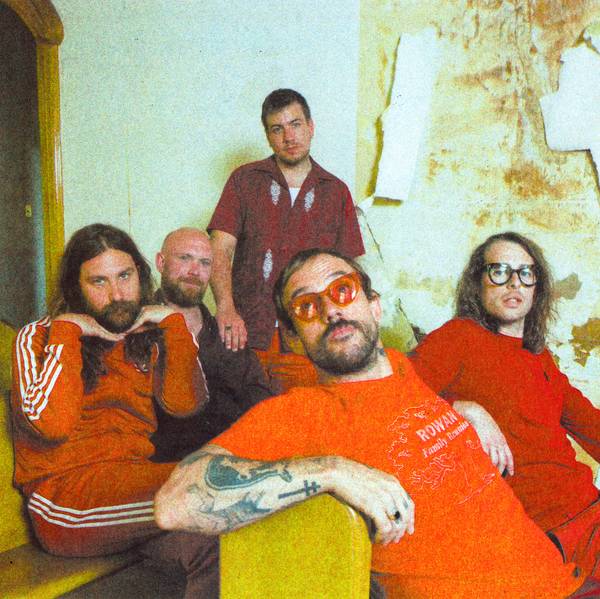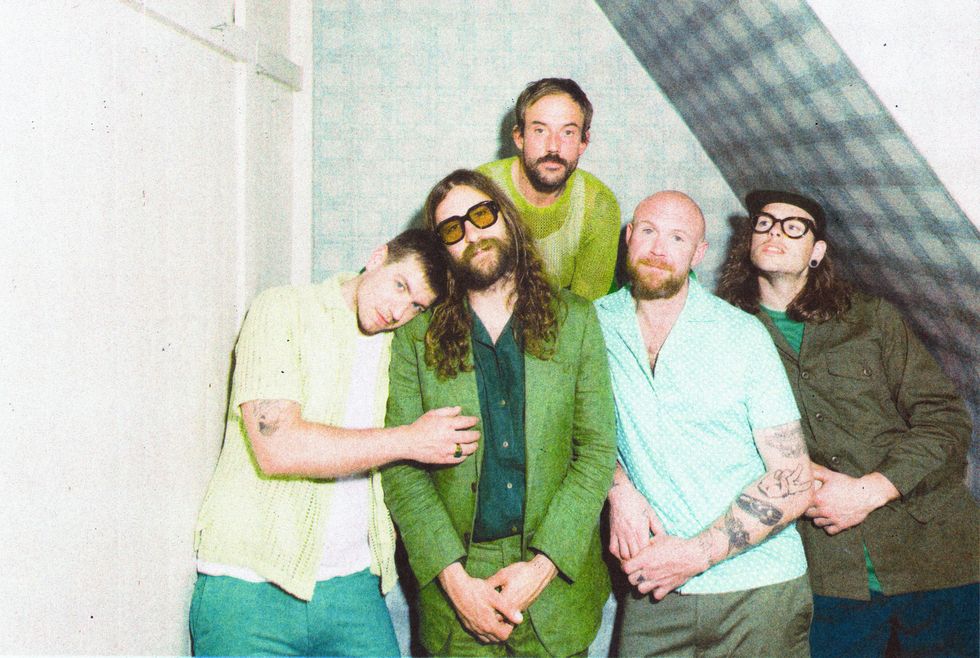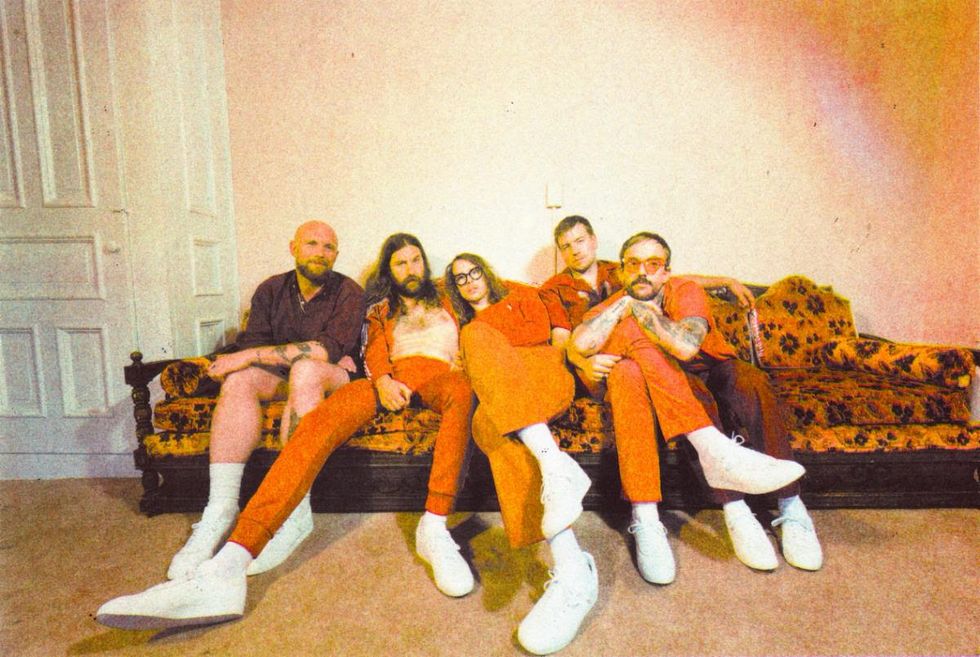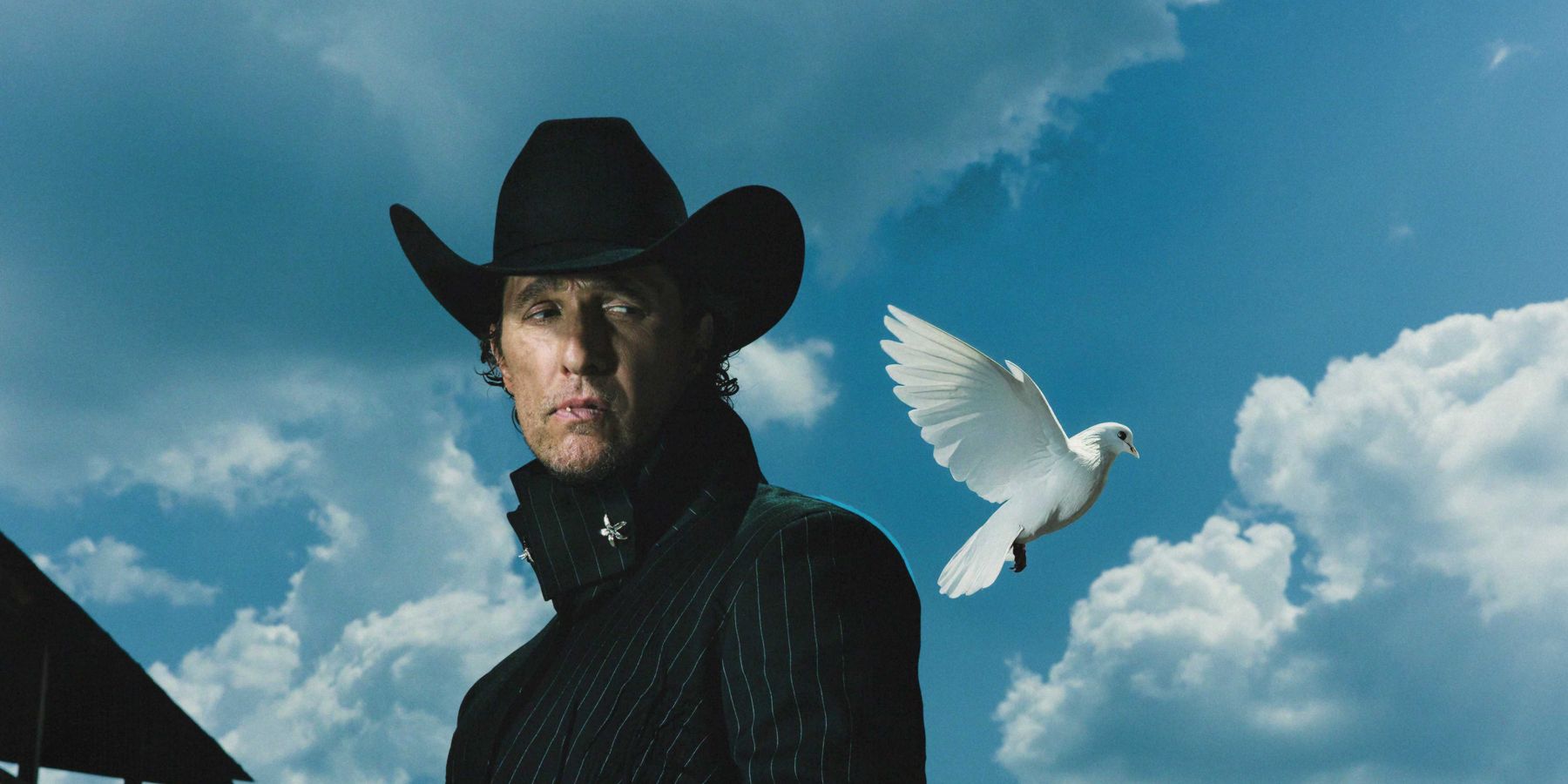
IDLES on Love, Life and Subverting Punk
May 08, 2024
We’re sitting in a conference room in Brooklyn’s Partisan Records and Joe Talbot, the vocalist and songwriter of Bristol-born punk band IDLES, is sitting across from me, unwrapping peanut butter cups as we get ready to start our interview. His relaxed demeanor stands in stark contrast to the Talbot I’d seen on stage just a few months ago at Bowery Ballroom — energetically leading a sweaty, sold-out crowd through the first live performance of the band’s latest album TANGK.
But the juxtaposition makes perfect sense. Since the band released their debut album Brutalism in 2017, they’ve shifted the definition of punk, molding their sound into something that elicits just as much hip-swinging as mosh pitting. Whether or not it's intentional, it’s made the once-gatekept genre feel approachable, pushing even the most die-hard indie rock fans (like myself) to show up in droves to experience their vast version of punk in person. With their seventh album, they’ve taken that approach even further. See, TANGK — unlike the band’s previous releases — isn’t about overcoming addiction, near-death realizations or coming face-to-face with your darkest self. No friends, as Talbot tells us, this album is “a bunch of love songs” that are “uncomplicated and unabashed.” And when it comes to love and IDLES, I think I’m qualified to speak on the topic.
See, around the time of the release of IDLES’ fourth album CRAWLER, I was deep in the midst of an internal struggle around moving back to New York City. It was 2021 and I’d been hiding from COVID in the South for more than a year; the thought of going back to the city and back to the grind of the industry after being furloughed from my music editor job was daunting. I wanted to go back to the place and work I loved, but when I thought of all the ways it could go wrong (again) love didn’t seem like enough.
That’s when I got an email asking if I could cover an IDLES show at Terminal 5 and interview the band about their album. The opportunity to ask questions about one of my favorite albums in person after only doing Zoom interviews for months? I was thrilled! But all that excitement disappeared when I realized getting to the gig on time was logistically impossible. Booking a flight to New York City from the middle of nowhere South Carolina with zero budget would never be as easy as just hopping on the subway. I was devastated. But that devastation shook me out of my fear of going back. I decided then and there somehow I’d figure out a way to move back to New York, I’d figure out a way to get back into music full-time, I’d figure out a way to do the thing I loved again. And somehow, someway, I did. So, would I be sitting here writing this in New York City if it wasn’t for that missed opportunity? If it wasn’t for CRAWLER? If it wasn’t for IDLES? If it wasn’t for punk and love? Thankfully, I’ll never know.
Below, PAPER sits down with Joe Talbot of IDLES to talk about subverting masculinity in punk, the road to TANGK and why (as they say in their track "POP POP POP") "love is the fing."

So, this is where you came to pitch the album?
Well pitch isn’t the right word. We didn’t have to sell it, they were going to release it either way. But explain it... because my albums always come with thematics.
Do you remember what you said?
So here’s what I tell everyone: It's a bunch of love songs and I wanted it to be uncomplicated and unabashed. Because I needed it. I needed love in my life. As an artist, yes, I’ve got plenty of love. But I wanted to make the narrative fucking vigorous, uncomplicated and undiluted. I was bored of being misunderstood. Like I learned in therapy, you can only control your own actions, so I took control.
So making this album about love — did the idea come before the songs or did the songs come after the idea?
The idea came before the songs. I'll come with a theme and intention. I think that's the only way we work well, is with intention.
And did you bring this to the rest of the band? Or was that a conversation that like you and [guitarsit/producer Mark] Bowen had about this being the theme of the next album?
Bowen trusts me now. I’ve become more fluent, so it's easier for them to just let me get on with it. They know I’m gonna execute it. And then we all write together. Well, Bowen and I write most of it remotely and then come together. I wrote on my own in Bristol, Bowen was writing in Belfast. And then we came together in London at [producer] Nigel Godrich’s studio and kind of cracked heads and tried to come up with most of the ideas as parts really, they weren't finished songs. We didn't have a single finished song we went into the studio.

Since that’s not typically your process, would you do it that way again? Did you like that process?
I learned a lot. I struggled at the start of this album with the inclusion of Nigel as part of our writing process, just because I'm not very good at change. I felt like I was a bit of a passenger at the start. I wasn't coming up with much. Then I got into it and wrote a bunch of stuff, but it took a while. Just out of my comfort zone. But I would do it again, because it's challenging. It makes you more vibrant, you know? It makes the writing process and it makes the album a lot more alive.
I’m curious about your mindset after your last album CRAWLER. There was a Grammy nomination, and I imagine it can go either way — digging deeper into that direction or going somewhere completely different. Why did you decide to go in this direction next?
CRAWLER was really us tee’d up and ready. Lockdown allowed us a lot of time and we saw that as an opportunity. We knew how lucky we were coming back to an audience that were going to buy tickets and albums and that's a fucking gift. We knew it was a gift. I was looking at all my friends who were going back to their day jobs, losing their jobs, losing family members. With gratitude comes hard work, just put your head down. The only way you can work hard is by making yourself uncomfortable and not just making something easy because you can. That was an opportunity to really fucking sit down and change it up. We did. When CRAWLER was done, it was a realization that we were capable of much more. And that's not to say that violent guitar music is a lesser art form. It's not, it’s just the same as any other music. We just wanted to try new things. There’s many facets to all of our personalities and there's five of us in the band and we wanted to explore the other facets of ourselves and express ourselves freely. You're not freely expressing yourself if you stick with one genre, in my opinion. If Beyoncé can do it so can we [laughs].
I wanted to ask you about moving from topics and subject matter that focus more on emotions like anger to shifting to focusing on love. Because in my experience, even love can bring about intense feelings of frustration and anger. Do you feel like those things can exist at the same time? This idea of anger and love?
Anger is a strange one for me. Because I was a very angry, angry little white man. And then you realize it doesn't do anything. Anger is a secondary emotion to fear, hunger, grief, fatigue, whatever it is. You can apply anger, and it's a very important feeling. There's a lot to be said for it. I was angry, but it was just self-pity, fear. And then I just realized I had to hold myself accountable for my actions and stop being a prick, start looking after myself and the other people around me. I came in the world a lot softer and with grace because I forgave myself so I wasn’t constantly fighting against the idea that I was the bad guy. The Black feminist movement was written off by a lot of people as angry. There is anger there, but it’s just part of it. But self care and empathy and love... I have a daughter now, and a good analogy is that to protect her I might have to get angry, because I love her so much. Somebody may take advantage of her naivety as a five year old — and I’d protect her. It’s okay to be angry, it’s what you do with it, you know? It’s all about how you manifest these things.
You’ve talked about starting out in the hardcore scene and this idea of punk and what it should be. And now, subverting that idea and the idea of masculinity and what that means for the scene? Is that something that’s always been important for IDLES?
It was just something I was trying to figure out in my head as a person. I wanted to be a better man. And as a representative, I wanted to change the narrative a bit and like, just to have a freer conversation about what masculinity is, to me, not what it is, in fact. I was just exploring that, because I had a lot of healing to do, and a lot of making up to do. I was not a good person, to myself and other people. I wanted to heal and get over the traumas and the addiction and all that shit. What better place to do it then on a record? It just felt like a really beautiful thing to be able to have a conversation with the world. It's almost like a commitment.
Photography: Daniele Topete
Related Articles Around the Web
MORE ON PAPER
Entertainment
Cynthia Erivo in Full Bloom
Photography by David LaChapelle / Story by Joan Summers / Styling by Jason Bolden / Makeup by Joanna Simkim / Nails by Shea Osei
Photography by David LaChapelle / Story by Joan Summers / Styling by Jason Bolden / Makeup by Joanna Simkim / Nails by Shea Osei
01 December
Entertainment
Rami Malek Is Certifiably Unserious
Story by Joan Summers / Photography by Adam Powell
Story by Joan Summers / Photography by Adam Powell
14 November
Music
Janelle Monáe, HalloQueen
Story by Ivan Guzman / Photography by Pol Kurucz/ Styling by Alexandra Mandelkorn/ Hair by Nikki Nelms/ Makeup by Sasha Glasser/ Nails by Juan Alvear/ Set design by Krystall Schott
Story by Ivan Guzman / Photography by Pol Kurucz/ Styling by Alexandra Mandelkorn/ Hair by Nikki Nelms/ Makeup by Sasha Glasser/ Nails by Juan Alvear/ Set design by Krystall Schott
27 October
Music
You Don’t Move Cardi B
Story by Erica Campbell / Photography by Jora Frantzis / Styling by Kollin Carter/ Hair by Tokyo Stylez/ Makeup by Erika LaPearl/ Nails by Coca Nguyen/ Set design by Allegra Peyton
Story by Erica Campbell / Photography by Jora Frantzis / Styling by Kollin Carter/ Hair by Tokyo Stylez/ Makeup by Erika LaPearl/ Nails by Coca Nguyen/ Set design by Allegra Peyton
14 October
Entertainment
Matthew McConaughey Found His Rhythm
Story by Joan Summers / Photography by Greg Swales / Styling by Angelina Cantu / Grooming by Kara Yoshimoto Bua
Story by Joan Summers / Photography by Greg Swales / Styling by Angelina Cantu / Grooming by Kara Yoshimoto Bua
30 September




